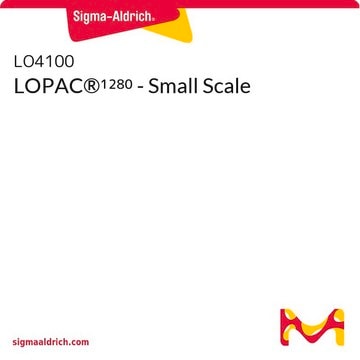R7150
Ro 25-6981 hydrochloride hydrate
≥98% (HPLC), powder
Synonym(s):
(αR)-(4-Hydroxyphenyl)-(βS)-methyl-4-(phenylmethyl)-1-piperidinepropanol hydrochloride hydrate
About This Item
Recommended Products
Quality Level
Assay
≥98% (HPLC)
form
powder
storage condition
desiccated
color
white
solubility
DMSO: >20 mg/mL
originator
Roche
SMILES string
O.Cl.C[C@@H](CN1CCC(CC1)Cc2ccccc2)[C@@H](O)c3ccc(O)cc3
InChI
1S/C22H29NO2.ClH.H2O/c1-17(22(25)20-7-9-21(24)10-8-20)16-23-13-11-19(12-14-23)15-18-5-3-2-4-6-18;;/h2-10,17,19,22,24-25H,11-16H2,1H3;1H;1H2/t17-,22+;;/m0../s1
InChI key
FEINQVNMUYISNW-HVDCVHHPSA-N
Gene Information
human ... GRIN2B(2904)
Application
- as NR2B antagonist for microinjecting rats to study the contribution of NR2B- and NR2A-containing N-methyl-D-aspartate receptors (NMDARs) to the formation of trace and contextual memory in prefrontal cortex (PL)
- as NR2B antagonist to study the effect of the protein expression of hypoxic-ischemic injury NMDAR subunits 2A and 2B in the SVZ of neonatal rats
- to induce deleterious effects upon memory consolidation and long-term potentiation (LTP) generation in the hippocampus
Biochem/physiol Actions
Features and Benefits
Signal Word
Warning
Hazard Statements
Precautionary Statements
Hazard Classifications
Eye Irrit. 2 - Skin Irrit. 2 - STOT SE 3
Target Organs
Respiratory system
Storage Class Code
11 - Combustible Solids
WGK
WGK 3
Flash Point(F)
Not applicable
Flash Point(C)
Not applicable
Personal Protective Equipment
Certificates of Analysis (COA)
Search for Certificates of Analysis (COA) by entering the products Lot/Batch Number. Lot and Batch Numbers can be found on a product’s label following the words ‘Lot’ or ‘Batch’.
Already Own This Product?
Find documentation for the products that you have recently purchased in the Document Library.
Customers Also Viewed
Articles
DISCOVER Bioactive Small Molecules for Neuroscience
DISCOVER Bioactive Small Molecules for Neuroscience
DISCOVER Bioactive Small Molecules for Neuroscience
DISCOVER Bioactive Small Molecules for Neuroscience
Our team of scientists has experience in all areas of research including Life Science, Material Science, Chemical Synthesis, Chromatography, Analytical and many others.
Contact Technical Service















